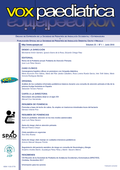![]()
Calendario de vacunación del niño y adolescente viajero
El número de niños y adolescentes viajeros a diferentes partes del mundo incrementa cada año, exponiendo a esta población al riesgo de contraer enfermedades infecciosas transmisibles. Muchas de estas enfermedades son prevenibles mediante la inmunización activa, mientras que otras medidas de prevención pueden aplicarse para reducir otros posibles riesgos relacionados con el viaje. Existen vacunas sujetas a reglamentación internacional que son de carácter obligatorio para ciertos destinos (Fiebre amarilla, enfermedad meningocócica y polio), mientras que otras vacunas se podrían recomendar en función al destino, itinerario y duración del viaje (Fiebre tifoidea, cólera, encefalitis centroeuropea, encefalitis japonesa, hepatitis A, rabia, sarampión entre otros). Es conveniente que el pediatra valore estos riesgos atendiendo en la consulta al niño y adolescente al menos de 4-6 semanas previas al viaje, considerando aplicar las medidas preventivas pertinentes. No se debe desestimar la oportunidad de esta consulta para actualizar el calendario de inmunizaciones sistemáticas, en especial en grupos etarios con bajas coberturas como los adolescentes. El pediatra debe atender a los retos que supone la dinámica y cambiante epidemiología de estas enfermedades para poder ofrecer las medidas de prevención adecuadas para esta población vulnerable.
The number of international travelers in pediatric age is rising annually, exposing this population to an increased risk of acquiring infectious diseases. Many of these diseases are preventable by active immunization, while other preventive measures can be put in place to reduce other common risks associated with international travel. There are vaccines which are mandatory by international law for different destinations (Yellow fever, meningococcal disease and polio) whilst some vaccines could be recommended according to the travel destination, planned activities and length of stay (Typhoid fever, cholera, tick-borne encephalitis, Japanese encephalitis, hepatitis A, rabies, measles, others). It is recommended for travel related risks to be evaluated by a pediatrician in a specific consult for traveling children and adolescents, which should be performed at least 4-6 weeks before the trip. On this consult, preventive measures should be applied, while the opportunity to actualize the systematic vaccine schedule should not be dismissed (especially in subgroups with low vaccine coverage). Pediatricians should attend to the changing epidemiology of these diseases to offer the adequate preventive measures on this vulnerable population.
| Adjunto | Tamaño |
|---|---|
| vp_26_1_22.pdf | 186.71 KB |



